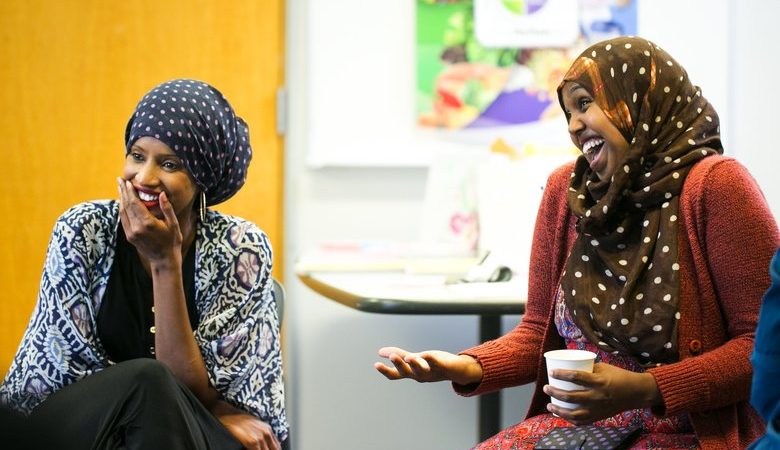
A CenteringPregnancy group in Columbia City is the first Somali-language program of its kind in the country. Obstetrician Alson Burke helps facilitate the program at Neighborcare Health clinic. (Bettina Hansen and Corinne Chin / The Seattle Times)
The Seattle Times | April 28, 2016 – A “centering pregnancy” program at Neighborcare Health provides prenatal care and community support to Seattle’s Somali-American population.
The mysterious underwater rhythm of an in-utero heartbeat is the signature sound of prenatal checkups. When I was pregnant, it was a ritual I looked forward to.
Now, four months after the birth of my son, I’m hearing that amazing sound again, but in a very different setting. It’s coming from behind a folding screen in a room full of women wearing brightly colored headscarves and mingling over sweet chai tea.

I’m at a Somali “centering pregnancy” session at Neighborcare Health, a clinic for low-income people off Rainier Avenue South. It’s a new approach to prenatal care, and the first Somali-language program of its kind in the country. It’s also an attempt to innovatively address significant maternal and child health disparities in our Somali-American population.
“I thought it was fun you know? Sharing information with other women and experiencing the same thing with someone else,” says Ayan Ali, 32, who is six months pregnant and a member of the group. “You get more time than regular appointments, too; you get to ask a lot of questions and talk to other women.”
Learning from peers is at the heart of the program, which brings women together to meet 10 times over the course of their pregnancy to discuss everything from fetal brain development to domestic abuse.
Though patients still consult privately with a health-care provider at the top of each session, they spend as much as an hour talking through issues and concerns in a group conversation facilitated by an obstetrician, a midwife and a Somali interpreter.
“Fewer preterm deliveries, higher rates of successful breast-feeding, lower rates of postpartum depression,” says Dr. Alson Burke, an obstetrician with UW Medicine who serves as one of the facilitators, recounting the proven results from this kind of program. “So from the science side it’s supported, and also from the community side it feels good.”

That sense of community was strong during the session I visited. Things started off slowly (maybe due to the reporter and photographer in the room), but soon the dozen or so women were sharing tips on how to choose a pediatrician, and discussing how often your baby should poop.
And it’s clear the women are comfortable with each other (like when Burke asked “Where should your baby sleep?” and Ali joked “Outside!” to an eruption of laughter).
The group also serves as a way to dispel the misinformation that can circulate in a community of mothers navigating a new culture — for example, that formula is better for babies than breast milk, or that women shouldn’t be physically active during pregnancy.
“The idea is that we let the energy flow, let them get going,” says Burke about the ability of the group to come up with the right answers themselves. “Occasionally the facilitators will bounce in and correct or redirect, but ultimately the group does a really nice job of running itself and directing where they need to go.”

Geni Sheikh, left, gives a hug to Kama Jele while Terecia Lee, right, holds Jele’s one-week-old baby Musa, during the Somali CenteringPregnancy program at the Neighborcare Health clinic in the Columbia City neighborhood of Seattle Thursday April 21, 2016. Sheikh is a registered nurse for King County Public Health’s Nurse-Family Partnership program and is a co-facilitator for the Somali CenteringPregnancy group. Lee was her student midwife, and was with Jele during Musa’s birth, doing labor management and support. “I was able to catch him when he came out,” Lee said, smiling. “It’s just so cool to see him, six days later.” They all met in the Somali CenteringPregnancy program. Normally the sessions are for expecting mothers, but this week they had invited mothers who had already given birth back to visit.
That self direction extends beyond the sessions themselves. Burke tells a story of two women from the group who were recently in the hospital at the same time — one for a delivery and the other due to a complication with her pregnancy. After a few texts, both were sharing in the food, family and support, helping to transform what could have been a frightening experience into one full of community.
“There’s a real sense of camaraderie, and I feel like that can be really lacking,” says Burke, who adds that pregnancy and new motherhood can be very isolating in the United States, especially if you’re new to the country. “Women realize they’re not alone.”
I started to feel a bit of that camaraderie myself as more experienced moms in the group shared some hard-earned lessons with a visiting newbie.
Ali, already a mother of seven, had advice that ran the gamut from infant (give them a bath and massage before bed to relax them to sleep) to teenager (friend them on Facebook but never comment on anything so you can successfully spy).
I can’t speak to the Facebook trick (yet) but I’ll tell you that bath trick is working like a charm.
..




Sarah Stuteville is a multimedia journalist and co-founder of The Seattle Globalist, www.seattleglobalist.com, a news site covering Seattle’s international connections. Sarah Stuteville: sarah@seattleglobalist.com. Twitter @SeaStute
.
.
______________________________
_____________________________________________________________________________________
Xafiiska Wararka Qaranimo Online | Mogadishu, Somalia
_____________________________________________________________________________________Advertisement
_____________________________________________________________________________________







